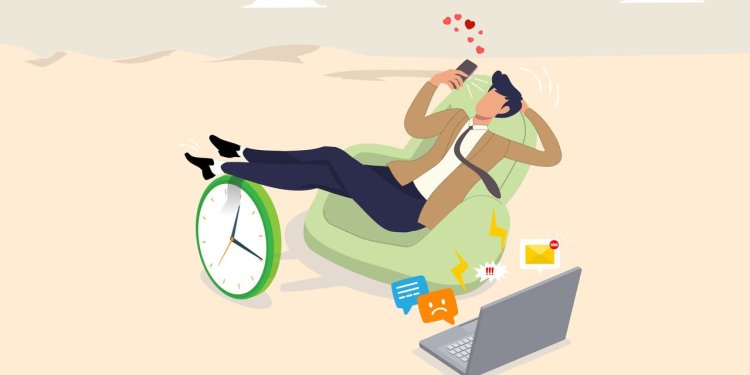‘Funemployment’ and the Gen Z Job Market
May 30, 2023 6:42 pm ET Photo: Getty Images Editor’s note: In this Future View, students discuss “funemployment,” a term being used by Gen Z. Next week we’ll ask, “Were people right to boycott Bud Light and Target for their stands on political issues? Should corporations be politically neutral? Can they avoid politics? Or should companies endorse political agendas?” Students should click here to submit opinions of fewer than 250 words before June 6. The best responses will be published that night. How to Be Happy Glamorizing “funemployment” shows disdain for hard work and is based on a hedonistic conception of happiness. More than 2,000 years ago, Aristotle argued that “the happy life seems to be in accordance with excellence; and this life is one accompanied by seriousness, not one that depends on amusement.” While much has changed since Aristotle


Photo: Getty Images
Editor’s note: In this Future View, students discuss “funemployment,” a term being used by Gen Z. Next week we’ll ask, “Were people right to boycott Bud Light and Target for their stands on political issues? Should corporations be politically neutral? Can they avoid politics? Or should companies endorse political agendas?” Students should click here to submit opinions of fewer than 250 words before June 6. The best responses will be published that night.
How to Be Happy
Glamorizing “funemployment” shows disdain for hard work and is based on a hedonistic conception of happiness. More than 2,000 years ago, Aristotle argued that “the happy life seems to be in accordance with excellence; and this life is one accompanied by seriousness, not one that depends on amusement.” While much has changed since Aristotle, human nature has not.
The unemployed experience 30% more negative emotions than the employed. People have an inherent need for structure and purpose. For most of history, hard work was seen as good in and of itself. Idleness was the devil’s work. People took pride in their vocations, whether they mopped floors or managed stock portfolios.
Many now believe that happiness is attained by throwing off traditional constraints and abandoning institutions that have stood the test of time. They attribute skyrocketing rates of depression and anxiety to the social pressure to succeed and the fast-paced work environment of the free-enterprise system. Real work environments, moreover, usually fail to live up to glamorous depictions on Instagram. Most jobs are hard and involve a considerable amount of mundane work.
But Gen Z won’t find happiness getting high in Ibiza, scrolling on TikTok or sleeping till noon. True work-life balance is important, and lasting happiness is achieved by working incrementally toward valuable, fulfilling goals—not in indulging the fleeting pleasures of “funemployment.”
—Anika Horowitz, University of Wisconsin-Madison, economics
We’re Coping
Our generation has been sold a lie. Irresponsible fiscal and monetary policies from politicians have caused the economy to stagnate. We were not responsible for kick-the-can stimulus packages, or a prolonged zero-interest-rate environment, yet we’re the ones paying the price. Companies we have dreamed of working for have instituted hiring freezes and layoffs, most of which specifically target junior positions.
“Funemployment” is not a concept conceived by recent graduates out of glee—it’s a coping mechanism necessary for graduates facing today’s job market. The majority of graduates without work followed the recipe: They chose the right major and did the work. But in today’s job market that doesn’t matter and graduates won’t be given a real chance.
We have grown up through war, financial crises, bubbles and scandals. We’ve seen and studied older generations’ mistakes, watched them create a more divided country, and felt the effects as the U.S. loses ground on the world stage. I know I’m not alone in thinking Gen Z can do better, and we want our chance. But for now, how about a job, please?
—Eli Thrasher, Dartmouth College, politics, philosophy and economics
Work Hard Before You Play Hard
Assuming that Gen Z isn’t simply renaming the gap year, then unemployment isn’t fun. It’s tedious and often demoralizing.
The concept of a gap year, or a sabbatical, has been around for ages. It is a period of time when you deliberately take a break from studies or work to engage in developmental activities. These activities often include learning another language, specializing existing skills or working unique jobs to explore new fields. While it is often intertwined with leisure, such as volunteering abroad, the main point is to grow as a person. Calling it “funemployment” implies that there is less self-improvement going on. It insinuates that it is a time of pure leisure, which can lead to stagnation if overdone for too long.
What Gen Z misses is that having a job isn’t just about earning an income. Jobs provide a sense of dignity and meaning. Professional work reassures people of the role they play in their community and inspires them to continue growing and learning.
While it’s important to set boundaries and take a break once in a while, the emphasis is switched. Work hard, then play hard. I know my upcoming vacation will be a lot more rewarding if it follows a long period of productivity.
—Rafael Arbex-Murut, University of California, Berkeley, information and data science
Lazy . . . or Strategic?
In contrast to the popularized view of major media outlets and older family members around the dinner table, the concept of “funemployment” can be a constructive, healthy and empowering tool for young professionals.
Because of its association with laziness and privilege, “funemployment” gets misconstrued as a negative way to spend one’s free time after completing school. But if implemented appropriately, taking time to be “funemployed” can be a strategic and effective option for those who are waiting for an opportunity to start their professional lives. I plan on being “funemployed” this summer, and in addition to waiting patiently for replies to submitted job applications, I will be using the time off to sharpen my technical skills, pick up old hobbies and nurture my relationships.
I value my future career, and getting a job has been my top priority. “Funemployment” encourages recent graduates, desperately seeking employment and structure, to work first on building a foundation of personal development and growth.
—Elizabeth Grace Coyne, Sacred Heart University, strategic communications and public relations
The Immigrant Work Ethic
As an immigrant, I find that “funemployment” as a concept feels alien, and it feels separated from the harsh reality of looking for a job to provide for myself and my family.
As I prepare to start my second year of law school, I am on the hunt for a job. Perfecting my résumé and cover letter, going to more recruitment events and preparing online applications take up quite a bit of my time. Given the sacrifices my parents made to come to this country and provide for me and my brother, I expect to do well. I don’t ever plan to take a long break, excluding the couple months between taking the bar exam and the typical firm start dates.
Ultimately, “funemployment” seems to be a rebranding done by those with the ability to take time off. But the reality is that markets are tough, and finding a job is even tougher. For many of us, “funemployment” is a distant dream.
—An Huang, University of Virginia, law
Click here to submit a response to next week’s Future View.
What's Your Reaction?













